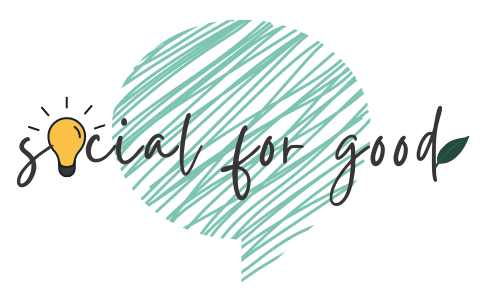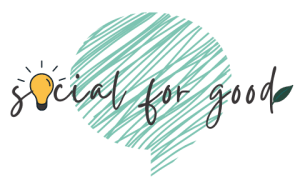An interview (and fangirl moment) with one of our social impact heroes – Monique Aiken.
Over the past few years, our team has come across a few real-life modern heroes in the social impact space. We wanted to share some of their stories with you, and we’re excited to start with Monique Aiken.
We’ve admired her for a while; we’ve seen her speak at conferences, listened to podcasts, even read her children’s book! The more our team learns about her, the more we realize the need to honor the work she has been doing. We’re proud to share that she also happens to be the sister of someone on our team (Marissa)!
What is your current role in the social impact space?
By day, I am Managing Director for The Investment Integration Project (TIIP). Our mission is to help investors align their strategies and practices with the increasingly complex world of the 21st century. We encourage the adoption of system-level investing to grapple with systemic risks like climate change, income inequality, and racial inequity.
Additionally, I’m in the process of launching the Restarter Fund, which aims to be a “Lifeline” for Small Business America. It is an economic and climate justice-focused platform to support shuttered businesses (as a result of COVID and other crises), which are disproportionately women-led (of all ethnicities), men of color, or on indigenous lands.
I am also Cofounder for Make Justice Normal (MJN). This collective exists to foster just relationships and collective action among people working to make justice normal. We piloted a podcast last fall called Into the Record, and I am the host.
Lastly, I sit on the board or steering committees of several organizations that are focused on justice, diversity, equity, inclusion, or sustainable investing. This includes the Intentional Endowments Network, Responsible Alpha, the Global Bio Fund and the Institute for Nonprofit Practice. Since its inception 5 years ago, I have served on the Investment Committee for the NYU Impact Investment Fund. This initiative offers students practical experience that puts many on the path to careers in impact.
What is the path that led you here?
No single event led me to a career and life focused on justice and systems change. We all assume that one action will make the biggest differences in the world, but it’s the small changes that build up toward larger outcomes. In some ways, I feel like my life is kind of a microcosm for how systems change.
Initial influences
That said, if I could point to a few things that started me on this journey, I would start with the fact that I am the daughter of immigrants. Both of my parents were born in Jamaica. I saw firsthand the hardships that immigrants have to push through, the othering often experienced by people with an accent, and judgment based on my skin color.
My paternal grandmother (everyone affectionately called her “Mama”) was another source of inspiration for me. As a young widow, she single handedly raised 8 children in Kingston, Jamaica. Remarkably, she also found the strength and resources to care for at least 20 other children. Though she didn’t have much, she lived by the principle that “if you learn about a problem, it’s your responsibility to do something about it.”
Young Adult Influences
In high school, I dreamed of becoming a diplomat. So, I completed my undergraduate studies at the School of Foreign Service at Georgetown University. However, an internship in investment banking (obtained through SEO) changed my perspective. Out of college, I worked in the banking industry in debt markets in NY and London. I was later selected for both a Toigo and a CSGM Fellowship and earned my MBA at NYU Stern. After graduating, I ended up in Commodity Derivatives.
As I considered the negative impact of energy companies on the environment, I became convinced that my life could be better invested. Helping companies manage the volatility in their income statement just didn’t feel like a life’s purpose. So, I joined the board of 200 Orphanages Worldwide. At that point, I began to see impact investing as the perfect intersection of my finance background and desire to help make the world a better place.
You never know what you’re training for.
All these experiences (and more books than I can name) brought me to where I am today. TIIP allows me to support systems change by influencing those who wield the most power in our current system (investors) at the top level. The Restarter Fund helps small businesses and restores resilience in communities on the frontlines of systemic risk. And MJN is more focused on a narrative shift, inspiring change on the individual level.
What would you say is your biggest obstacle on the path to achieving your social impact goals?
Realizing that no one person or group can affect change by themselves. Systemic change is more like a cruise ship than a speedboat. Global climate issues and social unrest cannot be solved overnight or with easy fixes. If we are going to change our outcomes, we must change our actions. And if we are going to change our actions, we must change our thinking.
Any step towards progress and justice will be met with backlash and attack by those benefiting from our current systems. But as did our ancestors, we persist. Not only to improve lives today, but literally the survival of our species depends on us doing more, faster, right now.
What motivates you to keep going every day?
If we create a world in which the most marginalized groups can flourish, we create a world in which we all flourish. Consider the “curb-cut effect”. Creating sidewalks that have curb ramps for people who need wheelchairs has the added benefit of improving access for people with bikes, strollers, walkers, and carts of all kinds.
There is no reality where the Black disabled trans woman in rural Mississippi is thriving – has access to clean air and clean water, food security, sufficient shelter, a stable job, healthcare, a chance to pursue her dreams – and everyone else isn’t.
There is no reality where a single rural woman with children in Somalia or Yemen or Bolivia or Micronesia is thriving – and everyone else isn’t.
Those women are also on the frontlines of a changing climate. For us not to choose extinction, we need to take urgent action. We must consider every choice we make as individuals, companies, investors, elected officials, at literally every level of society. It is our collective responsibility to ensure that there is a planet for my child (and yours) to grow old in. And their children’s children.
What kind of ancestor are you?
I think a lot about what kind of ancestor I am for future generations. As a Black woman, I know that my current access to education and a career is directly tied to the efforts of previous generations. Abolitionist agitations, slave uprisings, Black Liberation Theology, the civil rights movement, decolonization, and womanism all played a role. My ancestors imagined and fought for a world in which Black women could be seen as more than just a labor force from which to extract, or worse, a means for adding to the labor force.
In our world today, racial, ethnic, and gender inequities still pose systemic risks. Oppressive practices can manifest in the form of social unrest. The costs of injustice and inaction have included the extinction of communities, people groups, and ecosystems. Now that we know about these problems, in the words of Mama, it is our (moral and ethical) responsibility to do something about them.
How would you advise our readers to take action for social impact?
Effecting change in our own lives can be overwhelming, much less at the systems level. I get it. Here are a few steps individuals can take to fight for justice and sustainability.
- Each of us decide every day what to do with the money we have in our pockets. Some people also influence much larger pools of capital. Think about whether the companies you are purchasing from are sustainable and avoid oppressive practices. Are they part of the solution or making things worse?
- The book The Social Justice Investor: Advance Your Values While Building Wealth, Whether a Few Dollars or Millions provides personal finance guidance for both consumers and investors. The author weaves inspiring vignettes throughout the book, including a piece from me on how the name Make Justice Normal came to be.
- The book 21ST CENTURY INVESTING: Redirecting Financial Strategies to Drive Systems Change is a practical resource for institutional investors exploring how to connect systems thinking with investing.
- MJN is organizing our inaugural Street Works Earth in Jackson Heights, Queens during NY Climate Week in September 2024. The event will be part protest, part art gallery, and part block party. We will be exploring and co-creating solutions that match the community’s challenges as it relates to climate policies and actions. Our vision is that in 10 years there will be hundreds of Street Works taking place all over the world.
- We were seed funded by the Environmental Defense Fund, but we are still looking for donors and sponsors. We are also looking for people to spread the word (share please!) to ensure children, families, and professionals turn out in force. And if you’re in the tri-state area, we hope you’ll join us!
The Wrap Up
We hope you’ve enjoyed learning about – and been inspired by – one of our social impact heroes! If you are a small business with a mission for good or a nonprofit, we would love to partner with you to amplify your impact, too.


